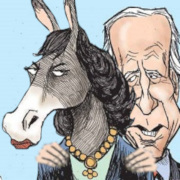|
OwlBot 2000 posted:I'll read that article as well, but one obvious response to "why there is so little money in politics" is because it just doesn't cost that much.. If companies really expect a 77,500% ROI on their lobbying-investments, why not keep going? If any other investment had returns like that, we'd expect it to be flooded with cash until companies started to crowd each other out.
|
|
|
|

|
| # ? Apr 25, 2024 05:37 |
|
OwlBot 2000 posted:I'll read that article as well, but one obvious response to "why there is so little money in politics" is because it just doesn't cost that much.. Pointing out that something generates a massive return is certainly not a plausible explaination for why they arn't buying more.
|
|
|
|
falcon2424 posted:If companies really expect a 77,500% ROI on their lobbying-investments, why not keep going? If any other investment had returns like that, we'd expect it to be flooded with cash until companies started to crowd each other out. e: it's kinda like the 2012 election. There was only so much advertising airtime around the end of october that the parties could buy in the swing states. That's why you saw money (in form of ads already paid-for) dumped into non-competitive states, like Romneypacs spending on ads in Pennsylvania. Diminishing returns and all that Rodatose fucked around with this message at 04:56 on Apr 29, 2014 |
|
|
|
Congressmen really aren't that expensive. If you as a corporation don't have hundreds of millions at your disposal you won't even get a meeting, but once you establish that you're able to be a reliable source of money it doesn't really cost that much to sway a lot of votes. The total volume of election spending and lobbying would likely be higher if congressmen needed more than a few hundred thousand to a million each. Companies don't need to spend more money, so they don't.
OwlBot 2000 fucked around with this message at 04:53 on Apr 29, 2014 |
|
|
|
Rodatose posted:A yes-no policy is not a function you can plug more and more money into to get perpetually increasing results. The scenario there is that they paid $116 million in lobbying to have medicare barred from negotiating on cost of medications. You can't 'double-bar' them from negotiating medications. Spending just enough to change policy is enough; after that you'd have less of a percent return for having spent more than you needed to. There are millions more policy decisions to be made that would benefit someone. Clearly the answer isn't that every firm with money already has what they want. The size of the US government and government spending means that from any single firm's perspective the potential for increased protections/contracts/subsidies is essentially infinite. asdf32 fucked around with this message at 05:02 on Apr 29, 2014 |
|
|
|
Rodatose posted:Well, that's getting away from the question of whether theoretical governmental-power-source of (direct) democracy is compatible with the theoretical economic-form of capitalism. Since the OP repeatedly references the United States I assumed we were talking about representative democracy, and more concretely the form that system takes in the present day US. My argument is not an a priori assertion that theoretical-representative democracy will not (roughly) represent or take into account the policy preferences of the average voter. My argument is that the current form of representative democracy that we have in the United States neither represents nor considers the policy preferences of the average voter, because of our (really existing) capitalist economy. So while we may have a nominally democratic system, in the final analysis, the effects of that system do not achieve its purported goals. In order to make the US a truly democratic society we would have to implement huge structural changes in our political system, and I claim that unless we abolish capitalism those changes will eventually be rolled back. If you have time, check out that paper I linked. Debunk fucked around with this message at 05:13 on Apr 29, 2014 |
|
|
|
asdf32 posted:There are millions more policy decisions to be made that would benefit someone. Clearly the answer isn't that every firm with money already has what they want. If you were in the defense lobby, yeah. They basically get unlimited amounts of money as is.
|
|
|
|
If one believes that a vote influenced by money is just as legitimate as a vote that wasn't influenced by money, why is a vote influenced by KKK paramilitaries or Maoist thought-reform or the threat of execution illegitimate?
|
|
|
|
Noam Chomsky posted:The truncated democracy that Dewey condemned has been left in tatters in recent years. Now control of government is narrowly concentrated at the peak of the income scale, while the large majority "down below" has been virtually disenfranchised. The current political-economic system is a form of plutocracy, diverging sharply from democracy, if by that concept we mean political arrangements in which policy is significantly influenced by the public will. http://www.chomsky.info/articles/20130305.htm
|
|
|
|
Debunk posted:My argument is that the current form of representative democracy that we have in the United States neither represents nor considers the policy preferences of the average voter, because of our (really existing) capitalist economy. So while we may have a nominally democratic system, in the final analysis, the effects of that system do not achieve its purported goals. Take it that those who have power (P) influence governmental agents (G) to make retention of power easier. -In a mode of society where the power to produce things or make actions happen is predominated by a class that owns capital in a way that self-sustains (P=capitalism) -And where the government is representatives democratically elected by the people (G=representative democracy) --Then those who have economic power will have only to exert their influence on whoever the representatives are and this will create a difference in policies favored by the people and those that are enacted (in the same way that if it was a papal theocracy, P would only have to exert influence on enough of the 'representatives of god,' and in doing so would create a difference between what god allegedly wants and what is enacted). In a direct democracy, where every individual is a representative of the society, this would at first be different because P would have far more representatives to exert influence to affect policy. This would mean to either bribe/give favors to a majority (which in practice turns out little different from keynsian welfare) or to lobby a majority (make extensive use of media and propaganda). Many competing capitalist actors with conflicting goals would have to win out over all other competitors to get pet legislation passed by the majority of people. Of course, capitalism's tendency to concentrate makes it so there are fewer and fewer competitors, and thus fewer competing messages. Market control leads to regulatory capture and thus your direct democracy is really mostly voting for a set of values set by and favorable to a relative few. Not all abide by a hegemonic culture's norms, but enough will that they are norms. tl;dr capital concentrates in the hands of a few and with that comes the ability to commandeer regulation undemocratically. If someone wants to contest this, contest that capital doesn't end up concentrating in the hands of a few. e: I'll read that paper overnight Rodatose fucked around with this message at 06:17 on Apr 29, 2014 |
|
|
|
Love the topic mate. On it, several things to consider. Democracy in its current state has nothing to do with will of the people. Rather it is the pissing contest of interest groups. Who gives more money to elect their candidate to in turn push that particular agenda. It is just the way it goes. Capitalism just works as you said as intended within that paradigm in my opinion. Today we assume that we should be making decisions. as a collective in order to make the decision in the interest of majority if not entirety of the nation. However that just does not work in a system where entire policy hinges on finding best ways to sway public opinion. So often it has nothing to do with merit, or actual issues or anything like that, but rather who can sell air better. Does capitalism has a big role in perpetuating current form of democracy? Sure, in my opinion it does by providing monetary sway and power to a very limited group of people who are willing to use it for political gains that in turn translate into real power. However i can not see any of this changing even if you agree it is all wrong. And the reason for it is that it is hard to come up with an alternative really  . .
|
|
|
|
poliander posted:Love the topic mate. Democracy is an idea; American democracy is a specific implementation of that idea. It is either better or worse than other implementations of democracy. Its certainly possible to change how democratic a country is by changing the countries laws. As an example of another implementation of democracy, Australia has a preferential voting systems, where you number candidates from 1 to n. In this system, a candidate needs 50% of the vote to win. If no candidate has 50% of the vote, the candidate with the lowest number of votes is removed from the contest, and the people who voted for that candidates have their votes flow on to their next number. Repeat until a candidate has 50%. This allows you to vote for a third party without your vote being "thrown away" if your pick isn't in the top two candidates.
|
|
|
|
OwlBot 2000 posted:Congressmen really aren't that expensive. If you as a corporation don't have hundreds of millions at your disposal you won't even get a meeting, but once you establish that you're able to be a reliable source of money it doesn't really cost that much to sway a lot of votes. The total volume of election spending and lobbying would likely be higher if congressmen needed more than a few hundred thousand to a million each. Companies don't need to spend more money, so they don't. Corporate America is not a monolithic entity agreeing on all things. Some companies want things that other companies don't want to happen. Why aren't internet companies and ISPs spending billions to outpace each other over net neutrality?
|
|
|
|
Best Friends posted:Corporate America is not a monolithic entity agreeing on all things. Some companies want things that other companies don't want to happen. Why aren't internet companies and ISPs spending billions to outpace each other over net neutrality? You arguably just answered your own question there: it would cost both sides too much. Mutually assured destruction.
|
|
|
|
Silver2195 posted:You arguably just answered your own question there: it would cost both sides too much. Mutually assured destruction.
|
|
|
|
Strudel Man posted:Much like how competing brands refrain from spending money on advertising against each other. Mutually assured destruction. Hmm. Firms do sometimes restrict their advertising as a form of tacit collusion, though.
|
|
|
|
Best Friends posted:Corporate America is not a monolithic entity agreeing on all things. Some companies want things that other companies don't want to happen. Why aren't internet companies and ISPs spending billions to outpace each other over net neutrality?
|
|
|
|
Best Friends posted:Corporate America is not a monolithic entity agreeing on all things. Some companies want things that other companies don't want to happen. Why aren't internet companies and ISPs spending billions to outpace each other over net neutrality? They are not a monolithic entity, they just happen to have certain shared interests that they individually pursue, which in aggregate functions the same as a class. Low taxes, deregulation, lower wages for their workers, less union rights, avoiding costly regulations are priorities shared by the vast majority of corporations and the rich. They don't need to explicitly collude (in fact, they don't want to help competitors) but if they all fight for the same changes they are in effect operating as a group. With regard to the latter point, neither industry has a clear advantage in terms of who is willing to spend more. Yes, they're both giving money to various groups and likely offering jobs to regulators, but there's no real reason to escalate the arms race if there's no way to secure a solid advantage. Additionally it's in the hands of the FCC and courts now so whatever money they're throwing around is not on the books. OwlBot 2000 fucked around with this message at 08:37 on Apr 29, 2014 |
|
|
|
falcon2424 posted:Actually, yes. There are cases where people actually will state preferences, then support opposition to those preferences. For example, many people believe we should cut foreign aid to a level higher than it currently is, since they grossly misunderestimate the amount the government spends on foreign aid.
|
|
|
|
Maybe socialisation and networking is more important than blunt bribery when it comes to securing votes from governors. Lobbying doesn't work because a politician has cynically prostituted his vote, but because the people he talks to (lobbyists, lobbied coworkers, and a social circle with the same class interests as the lobbying companies) have convinced him that its the right or at least a reasonable thing to do, and something that his friends will smile upon. Remember that politicians are idealists. If all you want is power, you'll become a capitalist, it's more productive and less humiliating. On the purity of democracy, the oracle example is deceptive. Of course the green party should win - it's the party people voted for. It removes something people consider an important part of democracy, the expression of the will, asymmetrically from one option. If you instead look at a system where people have access to a trustworthy oracle and, knowing it to be trustworthy, generally trust its voting advice, and compare to a hypothetical system where voters have no reliable information on voting decisions or time to form them, it seems absurd not to consider the former a better democracy even if you hold to some technicality meaning it isn't 'more democratic'. There are also situations where people are not given viable options that align with their preferences, whether because all major parties have colluded to exclude them or because parties that claim to adopt them abandon these claims when they achieve power. And again, captialism is inherently undemocratic because it gives a certain elite class privileged authority over the use of resources. The military in Egypt is not so powerful merely because it controls the guns, but also because it controls a large amount of the economy and can manipulate it to undermine governments seen as threats to their power. Western capitalists override democratic decisions on taxation by removing their money from the country, and openly threaten (though less often follow through) to do more whenever a policy not to their preference is floated. Peel fucked around with this message at 10:35 on Apr 29, 2014 |
|
|
|
Strudel Man posted:Much like how competing brands refrain from spending money on advertising against each other. Mutually assured destruction. This assumes that one company benefits at another's expense. When we're talking about subsidies, contracts and regulations that's far from the norm. Who gets hurt if Exonn ratchets up its subsidies, Lockheed gets an additional contract, or if Amazon and Walmart pile on some additional regulations to hinder start-up competitors - basically no one except tax payers. Again, the idea that businesses don't buy political influence simply because there is nothing more to buy, or because of some vague sense class solidarity where Exonn is concerned with Amazon's tax burden, is basically a non starter. There may well be other reasons, these arn't it. Among other things, this shows ignorance of the possible breadth and depth of corruption.
|
|
|
|
falcon2424 posted:it denies people's agency. Anyway, communism is economic democracy.
|
|
|
|
By the way, are we supposed to accept democracy as an intrinsic good? If so, how is that reconciled with obvious limits on democracy such as representation?
|
|
|
|
There can be multiple intrinsic goods to be balanced against one another. I regard democracy as an intrinsic good but more generally I'd suggest we take it as such for the sake of argument in this thread, since almost everyone ITT thinks of it as desirable anyway.
|
|
|
|
Peel posted:There can be multiple intrinsic goods to be balanced against one another. I regard democracy as an intrinsic good but more generally I'd suggest we take it as such for the sake of argument in this thread, since almost everyone ITT thinks of it as desirable anyway. I think this debate actually has two seperate parts. First is whether we should have a democratic economic system. This comes down to whether you think we must because democracy is an intrinsic good, or whether you think yes or no based on practical concerns. Second, there is the implication that capitalism actually topples democracy elsewhere. This is actually quite a lot different than simply pointing out that capitalism isn't democratic. Even a direct democracy supporter is going to be ok with a huge range of non democratic structures for practical reasons - no one wants to be on a plane piloted by the collective. The argument here is that unlike the airline pilot, economic elites will actually topple other democratic structures.
|
|
|
|
When you change the scope of the word "people" to include only those with enough wealth and influence to buy and sell human lives wholesale, then the United States government really is "of the people, by the people, and for the people." That just doesn't help us non-people at all.
|
|
|
|
OwlBot 2000 posted:
Your argument then is that business with similar resources will not, inherently, compete with each other. This does not seem to be true. Further, doing some research, google alone seems to have about twice times the market cap of comcast. So resources aren't equal. Why isn't google dropping a easy (for them) five billion on making this happen? Much more has been spent on much less from tech companies recently. Best Friends fucked around with this message at 17:53 on Apr 29, 2014 |
|
|
|
I think a big issue with why people are talking past each other here, is that we don't really understand where 'real' capitalism ends, and corruption of the system through human nature begins. Capitalism as an ideal does not inherently invoke money's excessive influence in politics. A free market economy is simply a prescription of how the ECONOMY should operate and nothing more. There is no reason why a capitalist economy couldn't employ laws and checks which effectively ban lobbying activities, corporate campaign funding, etc. So the answer seems to be that any system which allows one class to disproportionately impact the political process is anti democratic. Hint: this is any system at all. It happens in varying degrees in monarchies, oligarchies, communism, etc. and most likely would happen in a realized anarchic society as well. How is this possible? In any system there will be people jockying for power with varying degrees of success, so it's inevitable for some class structure to arise. And once it does, unless there are strong checks in place which I can't even conceive of, the powerful will start influencing policy in whatever direction they see fit, using whatever mechanisms available (be it money, social influence, terror...). The way I see it, the whole 'evils of capitalism' bogeyman is a distraction from the fact that the real human problems of self governance can't be solved by any one ideology. Whatever system you have, it's going to take a lot more work, and there will be resistance from those who want to maintain a status quo.
|
|
|
|
rudatron posted:All the rich people have a collective class interest though, so their collective interests are valued over other class' interests - that is not just in a democracy. And yet Soros, Buffett, and the Koch Brothers are all fantastically wealthy people with very different interests. "Class" roughly correlates to how much money you have. It sure as poo poo doesn't mean that wealthy people are a homogeneous group who all believe in the same things or have the same interests.
|
|
|
|
Jastiger posted:Even in old democracies and republics that were formed before, there was always a class system where some had more power and say in government than others-no system treated or even purported to treat each and every citizen as equal in the eyes of the law. How can the phrase "all men are created equal" possibly be taken as an intent to treat every citizen the same? It too nearly 150 years after those words were written before the franchise was extended to women. The intent of that statement is quite clear - not to provide equal opportunity to all, but to provide equal opportunity for all those who counted as competent and intelligent people, as judged by the rich white men who wrote those self-serving phrases. In the context of modern Founding Fathers worship, it's easy to take as a declaration of equality hundreds of years ahead of its time, but considering the circumstances of the time and the manner in which it was put into practice, it can just as easily be read as an implicit declaration that the many groups prohibited from voting did not even qualify as human (which was effectively true for women and openly acknowledged for non-whites). You spoke at length about the corrupting influence of capitalism, but quite a few of the Founding Fathers were capitalists themselves, and many quite successful. If capitalism is such a corrupting influence, then what does that say about the democratic ideals and proclamations of equality written by those capitalists? Let's not forget that the person who wrote "all men are created equal" owned a massive plantation and more than a hundred slaves, and there were other figures in the Revolution with even larger plantations.
|
|
|
|
Bacarruda posted:And yet Soros, Buffett, and the Koch Brothers are all fantastically wealthy people with very different interests. "Class" roughly correlates to how much money you have. It sure as poo poo doesn't mean that wealthy people are a homogeneous group who all believe in the same things or have the same interests. asdf32 posted:By the way, are we supposed to accept democracy as an intrinsic good?
|
|
|
|
rudatron posted:Sure, they have differing interests, but they share a self-interest in preserving their wealth ie- a class interest. Pay attention please. And why are the rich supposed to be so good at this class solidarity thing, but the poor arn't? Be careful answering "because they have the power", because their class concious collusion is apparently a major source of that.
|
|
|
|
asdf32 posted:And why are the rich supposed to be so good at this class solidarity thing, but the poor arn't? As I've shown in another thread, they're usually pretty good at class solidarity but don't have as much resources to pull together. Overwhelmingly, poor people and minorities in the USA vote for democrats rather than republicans, and the rich and white vote for the right. To the extent the poor aren't as good at recognizing their interests as they could otherwise be you can blame racism, religious bigotry and the media.
|
|
|
|
asdf32 posted:And why are the rich supposed to be so good at this class solidarity thing, but the poor arn't? Class solidarity among the wealthy serves to defend and perpetuate a state of existence for its members which is highly beneficial and desirable, (and ironically one which is quite analogous to socialism in many ways), but which is impossible to maintain beyond a certain population size. Solidarity among the poor, by contrast, necessarily serves to assault the beneficial position of the wealthy in an attempt to level the playing field by raising the poor class as much as possible. Once you reach a certain level of wealth, members here realize that everyone cannot have the standard of living which the ultra-wealthy enjoy (resources cannot support it) thus they work to sabotage the efforts of their fellow man while striving for their own success. A good analogy would be a sinking ship with only so many lifeboats. Those in the lifeboats have a vested interest in remaining in them, and those still on the ship will stop at nothing to get a seat.
|
|
|
|
Main Paineframe posted:How can the phrase "all men are created equal" possibly be taken as an intent to treat every citizen the same? It too nearly 150 years after those words were written before the franchise was extended to women. The intent of that statement is quite clear - not to provide equal opportunity to all, but to provide equal opportunity for all those who counted as competent and intelligent people, as judged by the rich white men who wrote those self-serving phrases. In the context of modern Founding Fathers worship, it's easy to take as a declaration of equality hundreds of years ahead of its time, but considering the circumstances of the time and the manner in which it was put into practice, it can just as easily be read as an implicit declaration that the many groups prohibited from voting did not even qualify as human (which was effectively true for women and openly acknowledged for non-whites). I think that is kind of my point, that the United States claims one ideal, but in reality that ideal is very different and very beneficial for a select group of people from the outset. Which, as you point out, puts the accumulation of capital at odds with a fair and equal government that applies equally to all citizens. Note, I am using the US Constitution for this description, not that all Democracies have to include all citizens. The US Constitution (or Declaration which is often read into the Constitution when deriving meaning) straight up says all people born here are citizens, all people are equal, and that tyranny by an elite is Bad News Bears. Yet, the same Constitutional Republic was borne out of and has repeatedly reinforced that it is all about tyranny except it doesn't come from a crown by from wealth over non-wealth. And capitalism was the engine to derive that wealth from others. Again, this doesn't mean Capitalism=Slavery, but it does mean that Capitalism makes it a helluva lot easier to justify-and systematically enforce- undemocratic behavior. Great discussion by the way, I'm glad there is some now. Another issue that came up for me regarding this topic is the power of capital on government. Lets look at the recent scandal involving the Sterling remarks about black people. This is a guy who has given a lot of money to charities that have directly benefited a lot of different groups, including those black people he apparently dislikes. On one hand his money says he has one political view-that certain groups deserve benefit, but (perhaps) his voting behavior and personal beliefs have another political view-that black people are inferior and he should not have to spend time in their presence. For the modern Capitalist cheerleaders they claim that the market will clear out any negative attitudes like racism, sexism, etc., yet here is an example of someone that has all of the "Wrong" opinions, yet is massively wealthy because of it. He wields, compared to the average voter, massive political and economic power and is able to have more of an impact in the electoral process than another voter. I use him as an example because there are elected officials who I am sure are the same way. They have one political stance, yet their economic interests are wildly different than the stated position and can have massive impacts on legislation and application of law. Isn't the accrual of capital in and of itself, regardless of election and campaign finance laws, anathema to a fair and equal political system? Another issue I have, and this is just me crowing about Capitalism and a bit of a ramble, but if its a good discussion point, then great: Why should someones ability to make a good burger, sell a great widget, or build a great bridge qualify them for more political power?
|
|
|
|
asdf32 posted:And why are the rich supposed to be so good at this class solidarity thing, but the poor arn't? In addition to what Owlbot said, the rich have overwhelmingly more influence over the media, which has a tremendous influence on peoples' views. While the rich differ on many things (like the Koch brothers vs. Soros thing someone mentioned), their views tend to overlap on issues that are key to preserving their wealth (or at least not allowing themselves to lose control over much of it*). Literally every person alive is heavily influenced by what they see and hear in the media (including myself and every other poster in this thread), and the vast majority of media we consume is produced either by major media corporations or companies owned/influenced by said corporations. While these media sources don't operate in lockstep (though sometimes it might seem like they do), they're not going to do anything that results in public interest strongly shifting against the interests of the individuals/organizations who own and finance them. This doesn't require a shadow conspiracy. *While some rich people might be in favor of wealth redistribution on paper, it's not exactly going to be nearly as high of a priority for them as it is for those directly affected by poverty/lack of financial security
|
|
|
|
Ytlaya posted:In addition to what Owlbot said, the rich have overwhelmingly more influence over the media, which has a tremendous influence on peoples' views. While the rich differ on many things (like the Koch brothers vs. Soros thing someone mentioned), their views tend to overlap on issues that are key to preserving their wealth (or at least not allowing themselves to lose control over much of it*). Literally every person alive is heavily influenced by what they see and hear in the media (including myself and every other poster in this thread), and the vast majority of media we consume is produced either by major media corporations or companies owned/influenced by said corporations. While these media sources don't operate in lockstep (though sometimes it might seem like they do), they're not going to do anything that results in public interest strongly shifting against the interests of the individuals/organizations who own and finance them. This doesn't require a shadow conspiracy. I'm sympathetic to this point but only to an extent. For two reasons. First, it's still people making the decisions. I think Falcon made good points in regards to human agency. And it's hard to accept that people will generally vote for things completely against their interest. This point implies that they will (for what it's worth, Owlbot is pushing a somewhat contradictory narrative that people know what in their interest, but don't get it). Second, someone is always going to be in control of media. Rime posted:Class solidarity among the wealthy serves to defend and perpetuate a state of existence for its members which is highly beneficial and desirable, (and ironically one which is quite analogous to socialism in many ways), but which is impossible to maintain beyond a certain population size. No I think you have the analogy all wrong. First it's not black and white. Wealth taken from the rich benefits the poor even if they don't end up rich. But secondly, the point being advertised is that the rich are the problem. I.E. the poor just need to dismantle the lifeboats and eliminate the rich. Then the ship stops sinking. And not only will they benefit from the stuff they take in the immediate but a whole host of long term problems are solved at the same time. My point is that they have the tools to do this already if only they recognized that this is what they need to do. It doesn't need to be bloody. All they need to do is display a fraction of the class solidarity the rich supposedly do, and they could overwhelm them in polls and get the things they supposedly need. The fact that they don't do this is an indication to me that: 1) They don't think these things are in their best interest 2) The type of class solidarity the rich are supposedly engaging in is near impossible because it requires the sacrifice of (perhaps short term) selfish interests. This is unlikely on a wide scale.
|
|
|
|
asdf32 posted:I'm sympathetic to this point but only to an extent. For two reasons. I have a hard time taking this as a serious comment. You could call almost any evangelical Christian that votes against their own interests due to a political stance on a religious issue like prayer or abortion or whatever they want to use their religion to justify. Or have you seen those guys with the "keep your government hands off my Medicare"? Agency is important, I get that, but the entire point of what I was talking about regarding capitalism was that money can be used to fool people into voting one way while the actual policy is another. quote:First it's not black and white. Wealth taken from the rich benefits the poor even if they don't end up rich. See the above issue. Things like religion or clan mentality or jingoism all play a role, and all of these things directly benefit the rich either directly or indirectly. Look at minimum wage laws. Study after study after study shows that raising the minimum wage is a good thing to help EVERYONE, even the rich. But, due to a whole bunch of other auxiliary reasons, often manufactured non-issues, people will actively campaign against these things even if they would directly benefit from that policy. I don't think its that the "poor" class don't care about one another. Its rather that the concentration of wealth at the top benefits a multitude of messages that intentionally distort what is true and what is based on fear. Fox News is literally dedicated to this proposition. Murdoch doesn't care if people buy his latest Fox News article or web service, what is vastly more important to the wealthy is that they keep fighting against and amongst themselves so no meaningful change can occur-which is exactly what happens.
|
|
|
|
eSports Chaebol posted:There are cases where people actually will state preferences, then support opposition to those preferences. For example, many people believe we should cut foreign aid to a level higher than it currently is, since they grossly misunderestimate the amount the government spends on foreign aid. This is worth pointing out. I think the types of things people will say in a study are not necesarily going to be reflective of what they want or what they'll actually do. As an aside this is one benefit (often) in my mind of a market. It forces people to put some skin in the game (money) and because of that I think it often gets a truer approximation of what they really want. Someone might say they like the local coffee shop but if they always go to the Starbucks instead it's a pretty safe bet they actually like that better. This type of cold decision making is often critically important (particularly to dispose of outmoded organisations), and not something polls, or even votes are necessarily going to discover. However, the study posted earlier is interesting because of the difference between the rich and poor - the rich get what they say they want, the poor don't. A disparity between polls and votes wouldn't explain that. As another aside, one relevant detail is that there is a wide voting rate disparity between rich and poor. The rich vote almost twice as often as the poor. On the one hand this provides evidence for the rich impeding the political action of the poor (through voting restrictions). On the other hand, it's harder to argue that the poor are really fighting for what they want when only 40% show up at the ballot box. Note that this has direct implications for why the rich might be getting a disproportionate amount of what they want, although without running more numbers, I doubt it accounts for much of it. [ 
|
|
|
|

|
| # ? Apr 25, 2024 05:37 |
|
asdf32 posted:No I think you have the analogy all wrong. You seem to be disregarding the fact that the poor operate under a level of systemic oppression that works against them 1) achieving class consciousness, 2) organizing together to work in their collective interests, and 3) actually achieving their interests. Let's take the example of Occupy Wall Street to see these forces in action. First, of course, you are raised from birth with propaganda via education, the media, and prevailing societal mores to adopt a pro-rich ideology. Next, when some group does gain consciousness of their situation, they are immediately vilified as "lazy whiners" and met with derision for not having a grand unified plan. Finally, militarized police are used to assault the protests and drive them back out of the public sphere. Another example is that you suggest "overwhelming [the rich] in polls," but of course the vast majority of elections do not have any candidate that isn't on the side of the wealthy. To make a real change through voting, you'd have to do a lot more than just vote. e: This also ties in to your latest post. Why should the poor turn out for an election when the choice is between the guy who wants to gently caress them and the guy that wants to screw them? Capitalism has distorted American politics so much that the rich have already won the election before the first vote is cast. I'm not necessarily suggesting that the issues you raise aren't present, but the process from "we're all poor" to "dictatorship of the proletariat!" is a lot more difficult than you seem to imply. Mornacale fucked around with this message at 02:53 on Apr 30, 2014 |
|
|
























